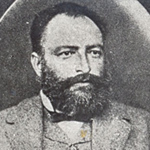Dimitar Brakalov
Dimitar Todorov Brakalov (1840-1903)
 In the history of Burgas one of the names that must appear with gold letters is the name of Dimitar Brakalov. He was a genuine figure in the Bulgarian Revival, an active participator in the struggle for Bulgarian independence and builder of prosperity for the city of Burgas.
In the history of Burgas one of the names that must appear with gold letters is the name of Dimitar Brakalov. He was a genuine figure in the Bulgarian Revival, an active participator in the struggle for Bulgarian independence and builder of prosperity for the city of Burgas.
Dimitar Brakalov was born in the town of Kalofer on 10.01.1840. He graduated in law in Constantinople. 1867 he arrived in Burgas and became tenant of two Turkish farms. In later time he purchased more farms in the Burgas region, where he grew wheat, which was exported for Constantinople via Port Burgas. His actions set the beginning of the corn trade in Burgas.
D. Brakalov was first to recognized the great opportunities and prospects of the Burgas port for the development of Bulgarian economy and began to organize the corn trade himself. In his farms Brakalov introduced new forms of labour - hiring up to 100 permanent workers, and increasing the employs to more than 400 from across the region during the peak season. At the same time he strongly supported the introduction of technological innovation in agriculture and became the first Bulgarian to purchase a harvester from England and later a threshing machine. In his farm, for the first time in the Bulgarian lands has been grown the new agricultures: potatoes and sunflower. All these events are crucial for the further economic development of Burgas after the Liberation and thanks to the opportunities created by Brakalov and his followers, the biggest Bulgarian mills, creamery, distilling dregs and others factories were built here.
Respected by the Turkish authorities, a multilingual person (fluent in Greek, Turkish, French, Russian) - all these qualities put him at the forefront of the emerging Bulgarian society here. D. Brakalov is one of the founders of the Bulgarian Municipality in Burgas before the Liberation. He actively participated in the struggle for the establishment of an independent Bulgarian church and school. Thus he was sent into exile in Diyarbakir.
He returned to Burgas in late 1878 and again stood at the forefront of the struggle for establishment of the Bulgarian economy and statehood. Here after he held various government positions: district chief, district president, Member of Parliament, three times Mayor of Burgas between 1884 and 1898. He is well known for his philanthropy: giving away his own clerical salary to the poor, and often stepping in as a lawyer defending the poor for free.
The second mayoral term of Dimitar Brakalov (started on 10.04.1895 and lasted until 8.09.1897) is the most effective in the history of Burgas until then. In this period began the urban planning of Burgas, which gave the appearance of a modern European city. This policy of the municipal government continued in establishment of special departments to clean the city and strict sanitary control. A tender was announced for construction of the city’s water supply system and construction plot for a new second-class hospital was set on the place of the old City Hospital. Planning of Sea Bath started next to the new port in construction.
The amendment to the city planning is also connected with the creation of a square in front of the Bulgarian church and school, also called St. Cyril and Methodius. A campaign was started aiming to raise funds for the construction of a new church because the old was already too small and miserable for a Cathedral of the Bulgarians in the town. With this an old dream has come true for Dimitar Brakalov.
He died in Burgas on 18.12.1903 at the age of 63, leaving no direct heirs.
Today Brakalov’s house has been declared a cultural monument and is home to the Ethnographical exposition of Burgas and the Prize "Dimitar Brakalov" is awarded annually for contributions to the development of Burgas and citizenship.